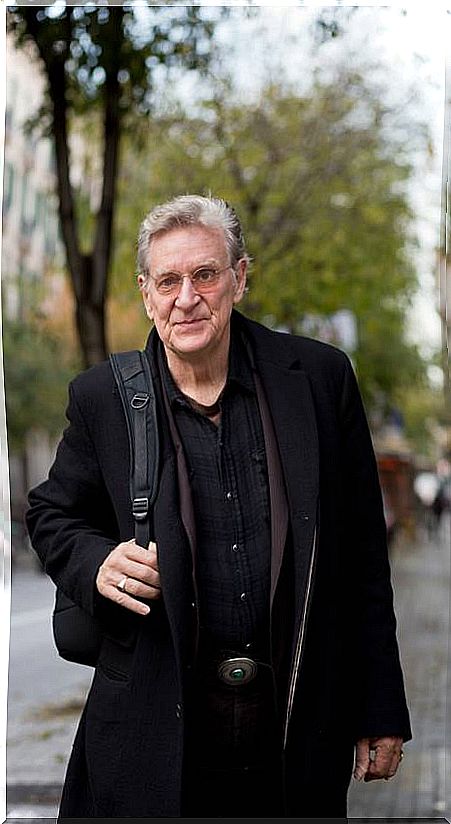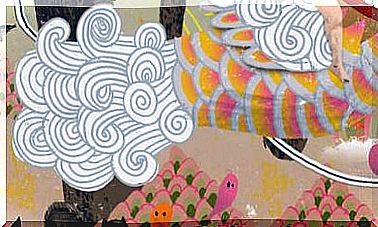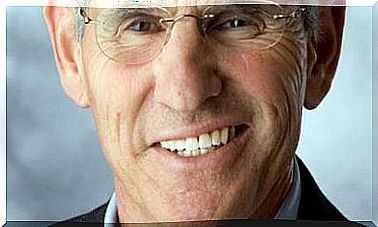“Knowing How The Mind Works Is Much More Effective Than A Drug”
Robert Thurman was the first Westerner to live with monks in Tibet. We chatted with this Buddhist expert about his history and how Buddhist psychology helps you get to know yourself better.

The surname Thurman carries cinematic resonances, but Robert Thurman made a name for himself long before the actress, his daughter Uma. In the early 1960s, this passionate American traveled to India to delve into Tibetan Buddhism with exiled monks. Upon his return to the United States, in addition to translating numerous texts and becoming an authority on Tibetan culture and language, he contributed to spreading the cause of this people against China.
Robert Thurman, a pioneering Buddhist
In 1987, Robert Thurman founded the Tibet House in New York with Richard Gere and Philip Glass. Today he holds the first chair of Indo-Tibetan Buddhist Studies in the United States at Columbia University and is the author of several books, including La vida infinita (Ed. La Llave) or The Tibetan Book of the Dead (Ed. Kairós)
He lives on the outskirts of New York, in a house in the woods that he started building himself 40 years ago, not wanting mortgages. He is the father of four children by his current wife, Nena von Schlebrügge, and a daughter from a previous marriage.
– Who was Robert Thurman before traveling to India?
“He was a slightly rebellious New Yorker.” At the age of 17, I dropped out of school and tried to join
Fidel Castro’s revolutionary army, although luckily they didn’t admit me: they would have killed me the first day! I went to Mexico for a year and then returned to the United States to study English: I wanted to be a writer. While still in college I got married and had my first daughter. But one day I had an accident and lost an eye.
That turned my life upside down. I felt that I had to find answers to the questions that had disturbed me as a result of my readings: Hesse, Nietzsche, Wittgenstein, Jung, Freud, Erickson … also some Buddhist texts. It was then that I decided to travel to India: I had the feeling that there I could find answers.
– What attracted you to Buddhism in those early days?
– I was encouraged by the statement that we can come to understand reality and that understanding frees us from certain kinds of suffering. In the culture from which I came, from religion you were asked for a blind faith, something that I never had, and from science you were told that you could investigate a small part of reality, but that you could never understand everything. I was not satisfied with these ideas. Also, I saw a lot of unhappiness around me. And he didn’t want to go the same way.
“I was encouraged by the statement that we can come to understand reality and that it frees us from suffering”
Buddhism opened the possibility for me to understand myself better, to better understand the world and to help improve it. I was also attracted to the fact that it was a very logical and at the same time spiritual system.
The first western monk in India
–He was the first Westerner to become a Tibetan monk. Why did you choose that path?
– As soon as I began to study the Tibetan texts and language, I discovered my vocation. I felt like I had come home from wandering lost for years, and I wanted to dig deeper. There was no option to go to Tibet, because it was under Chinese control, so I went to South India. There the monks lived in refugees and could not afford to host a Westerner like me, but in the end the Dalai Lama offered me the possibility to stay and live as a monk.
“I felt like I had come home from wandering lost for years, and I wanted to dig deeper.”
On the advice of my first teacher, I did not get to order officially. In the Tibetan tradition, if you become a monk, it is forever. Maybe someday you want to leave or have to, he warned me. So it was. I left the monastery three years later …
– What memories would you highlight from that stage?
– What I remember best is the friendship that was born with the Dalai Lama and our talks. I studied with their teachers, we were of a similar age, and we met to talk about philosophy, science, history, politics… it was also wonderful for me to be able to study Tibetan medicine.
– What led you to return to the United States?
– Several reasons came together. I didn’t really have a monastery: at that time, in South India, Tibetan monasteries were being formed. Today it is possible to go there and pursue official studies, but half a century ago it was different. Also, it was very difficult to get a resident visa. And, being an American myself, the Tibetans wondered why I didn’t help them spread the word about their situation vis-à-vis China or obtain funds for the refugees.
The return to the US in the turbulent 1960s
– When did you decide to also leave the life of a monk?
– In the United States, if you wanted to continue deepening and at the same time helping Tibetans, the best option was to work as an academic. If I had tried to enter the American university with a shaved head and a tunic they would have thought me crazy. In fact, my daughter Uma, when she saw a photo of me from that time and in that guise she said to me: “Dad, you looked like Henry Miller in a transvestite!”
It was also the time of the Vietnam War protests and the civil rights movement… and there were many problems with drugs. I felt that I had to do something, that I had to help.
“When my daughter Uma saw a photo from that time she said to me: ‘Dad, you looked like Henry Miller in a transvestite!'”
“Shortly after he fell in love and got married.”
-Yes, I fell in love … I lost my oremus for Nena!
– How does Buddhism help to deal with romantic love and life as a couple?
–Tibetan mysticism, tantra, teaches you that women are intelligent. That allowed me to be more open and learn more about life from my wife, and it turned out that my wife is especially intelligent and knew a lot about life!
I continued to delve into the family, learning, for example, not to consider my children my property. In Tibetan Buddhism, due to karma, children have their own previous life and their own destiny. You accompany them without trying to oppress them, giving them freedom so that they can continue on their way. You try to be less selfish, although you don’t always succeed …
“In Tibetan Buddhism, you accompany your children without oppressing them, giving them freedom so that they can follow their path.”
Buddhist psychology for a happier life
–Can Buddhism help to cope with psychological problems?
Yes, in fact the Eastern tradition is several thousand years ahead of modern psychology. This, in addition, has been trapped by an excess of scientism and materialism. Neuroscience and neuropharmacology, for example, identify the mind with the brain and take root in the idea that drugs, stimulation of areas of the brain, or other means will one day be able to control the mind. it is even believed that enlightenment is in the brain and that it can be controlled.
Instead, Buddhist psychology proposes controlling the mind using the mind. And I think that good psychotherapists know that this is the way: that listening to people and knowing their history can help them reinterpret their experiences and feel better, more integrated.
Drugs can temporarily help a severe imbalance, but generally do not fix the problem. It is much more effective to learn to take care of yourself and to know how the mind works through simple observation.
“Drugs in general do not solve problems. It is more effective to learn to take care of yourself and to know how the mind works.”
– Do you propose to apply meditation to the therapeutic process?
– Meditating does not solve everything: there are very neurotic people for whom meditation can even be counterproductive. But in general it can be very useful.
Some psychologists are afraid of meditation or Buddhism because they misinterpret the teaching of emptying oneself: they believe that the goal is to weaken the ego. A psychologist, for example, said: “Western psychology makes someone who believes he is nobody to believe himself someone, while Buddhist psychology makes someone who believes he is someone to realize that he is nobody.” This is very witty, but wrong.
For Buddhism, neurotic people worry too much about themselves and what they need is to open up and connect more with others, not learn to become someone: that would mean separating themselves even more from others. There are experiences of emptiness in which you seem to disappear, but these are only temporary states in which you become aware that your identity is flexible, resilient and that it depends on your circumstances.
This is very different from believing that you are nobody; on the contrary, you feel much more connected to yourself and to the world.
“Neurotic people worry too much about themselves and what they need is to open up and connect more with others.”
Understand that we are part of a whole
– Why do you consider that the study of the brain is not the most appropriate way to know the mind?
– Buddhism gets along well with clinical psychology but not so much with empirical psychology, so influenced by neuroscience and pharmacology. Buddhism is empirical, but it does not share the dogma that the brain produces the mind.
For Buddhism, the brain is a product of the mind : it results from the existence of human beings who in previous lives have developed greater altruism, empathy and sensitivity.
–If the brain is a product of the mind, where does the mind come from?
–The mind has always been there and will continue to be there. It has no beginning. The principlelessness of the universe is one of the principles of Buddhism.
–He speaks of the mind as if it were a single mind and common to all…
–From the point of view of Buddhist enlightenment, it can be understood that there is only one mind. But that is not at odds with the fact that people feel their individuality. Suffering appears when that feeling of separation is exaggerated.
Being aware of the uniqueness of the universe is part of the enlightenment process, but it does not go through denying the individuality of the other. Buddhism defends non-duality, which is not the same as uniqueness in the broad sense.
– How does understanding this non-duality help?
–There is a tendency to believe that enlightenment consists only in deeply feeling uniqueness, and that experience is important, but enlightenment, to be complete, has to go further : at the same time that uniqueness is experienced, a new type of individuality open to otherness, to the individuality of others.
This enhances compassion and encourages those who feel alienated and suffering to realize that things are really fine, that they are not separated from the world and that they should not fear or fight it, but enjoy it.
“At the same time that uniqueness is experienced, a new type of individuality open to otherness, to the individuality of others, has to be integrated.”
–This reminds me in part of the classic self-help I am fine, you are fine…
–Many psychotherapies work this idea well, but some, and I am not saying that this is the case, simplify it. Telling someone to think positive and that it will be fine is of little use. Some people connect with the dark side of life and feel trapped in something deep that requires going beyond.
It is true that deep down everything is fine, but doing a certain type of work is important. Everything is fine on a deep level, but it is not something that anyone can take care of; it is in your nature. And it is from that deep being that you can work and unravel your complexities.
An optimistic view of life
– Does suffering come from not understanding reality?
–It comes from ignorance. When you understand reality you are in nirvana, because you are free. Therefore, science is the main task of Buddhism. Botany, medicine, nutrition … were highly developed in ancient India. Observing reality, Buddhists saw that the mind is the element that most influences health, life and society.
The problem is that ideas such as that everything that exists is matter, that the mind is a product of the brain, or that when you die you are nothing, have become dogma. From this Darwinian perspective the world makes no sense : everything is the result of chance and arbitrariness.
–Buddhism is considered an optimistic philosophy…
–Yes, because Buddha discovered that the reality of the world is nirvana. Nirvana is sometimes believed to be out of this world. But it’s not like that. There is no absolute “you” and “me”, an essence that is you and another that is me that separates us. And the wisdom lies in transcending the illusion that we are independent beings and realizing that everything is clear light, energy, that we all flow in one great ocean.
“Sometimes it is believed that nirvana is out of this world. But it is not. Buddha discovered that the reality of the world is nirvana.”
Meditation and altruism
– What questions should we ask ourselves to move towards that degree of consciousness?
–You have to start by looking for yourself. You may think that it is you and that everything else is apart. But look at yourself carefully and ask yourself: where am I?
Those who meditate find that the sense of identity dissolves: the disappearance of the self results from looking for it and not finding it. When you realize it, enlightenment occurs. Now, it is a process full of traps and requires a lot of concentration, because you are looking inside yourself when in reality you are outside: you are “the one who seeks”.
You could say that meditation is like a drill : it keeps the analytical nature of the mind fixed in a point to open a hole and reach the hidden reality in the depths of being.
–How can the relationship with others help in this process of growth?
–Altruism helps us. The unhappiest people are the most self-centered. By focusing on others, one stops evaluating everything based on oneself: if this hurts me, if I win, if mine is better … The moment you wonder to what extent you are happy or like or dislike something, the mind begins to compare and that generates dissatisfaction.
“The unhappiest people are the most self-centered. By focusing on others, you stop evaluating everything based on yourself.”
“And how do you cultivate that kind of generosity?”
Generosity is the best way to relate to the material, because it implies detachment from it. When one clings to the material, it is easy to fear losing it, to feel that he does not have enough or to compare himself with others; On the other hand, if you wonder what you can do for others, let the material flow through you and that is one of the greatest sources of happiness.
–In his book La vida infinita (Ed. La Llave) he invites us to open up to the reality of an infinite life. Why should you believe in it?
– Believing in infinite life is not easy. It takes time. Now, everyone believes in the principle of energy that is neither created nor destroyed, but transformed. If we look at nature, everything is continuity : the plant dies, the seed is sown and a new one grows. There is no definitive ending. Why should consciousness be any different?
You have to think critically, put your own beliefs to the test. Energy transforms, and the mind is a subtle energy: why should it be the only thing that disappears? If it could become nothing, right now it would be nothing either. Is it just the brain, which makes us think that the mind exists?









